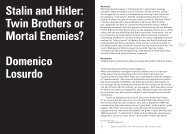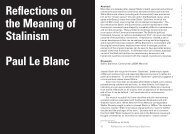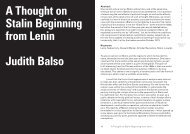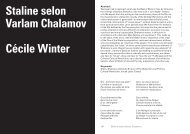adrian
adrian
adrian
- No tags were found...
Create successful ePaper yourself
Turn your PDF publications into a flip-book with our unique Google optimized e-Paper software.
the world (allgemeines Interesse an der Welt), because it iscertainof its presence in the world, or that the world present to it isrational.It seeks its ‘other,’ knowing that therein it possesses nothing elsebut itself: it seeks only its own infinitude (Unendlichkeit). 73Hegel’s primary concern in this paragraph is to distinguishthe Reason (Vernunft) of the third section of the Phenomenologyfrom the Consciousness (Bewußtsein) of the first section. Despitepotential misunderstandings to the contrary, the Reason whoseinitial incarnation is in the rational observation of nature (as per theempirical, experimental, mathematized sciences of modernity cofoundedby Bacon and Galileo early in the seventeenth century) isnot tantamount to a simple regressive return, in the aftermath of thedialectical self-sublation of the Self-Consciousness (Selbstbewußtsein)of the Phenomenology’s intervening second section, to thephenomenologically previous standpoint specifically of the firsttwo figures of Consciousness, namely, Sense-Certainty (sinnlicheGewißheit) and Perception (Wahrnehmung). For Hegel, the primarysignificant difference between Sense-Certainty and Perception, on theone hand, and Observing Reason, on the other hand, has to do with,as he emphasizes in the above block quotation, the contrast betweenpassivity and activity—with Bacon’s stress on the active role of thescientific investigator being pivotal both historically and (phenomeno)logically in this precise context.Consciousness overall, including Sense-Certainty andPerception, sets as its own standard of the ultimately True a notion ofobjectivity as utterly independent of subjectivity and passively received/registered by the latter (the Self-Consciousness of the subsequentsection reverses Consciousness’s prioritization of objectivity oversubjectivity). Reason, by contrast, sublates both Consciousness andSelf-Consciousness such that its orienting standard of the WholeTruth is a rationally articulable ensemble of structures and dynamicscommon to both subjectivity and objectivity. These structuresand dynamics are described by Hegel in language that risks beingmisconstrued as subjectively idealist in that he speaks of “concepts,”CRISIS&CRITIQUE#3“ideas,” “logic,” “syllogisms,” and the like, 74 terms that have strongassociations with images of mindedness in which subjective mind isset apart from objective world à la pre-Hegelian (i.e., non-dialectical/speculative) versions of the subject-object distinction (with Hegelwarning of this risk and the need to avoid it 75 —a caution underscored by,among others, Ludwig Siep 76 and Westphal 77 ). However, by this pointin the Phenomenology with Reason, subjective idealism (including theKantian transcendental variety) has been sublated (both in the finalsub-section on “Consciousness” [the chapter entitled “Force and theUnderstanding”] as well as the section on “Self-Consciousness” inits entirety). That is to say, starting with Reason, the Phenomenologypresents a non/post-subjective idealism (i.e., an objective and/orabsolute idealism) in which apparently subjectivist language actuallydesignates a rational reality composed of configurations that cut acrossthe subject-object divide, being both objective (as substantially “inthemselves” apart from any and all knowing subjects) and subjective(if and when they become also “for themselves” through humanmindedness and like-mindedness) and reflected in isomorphismsbetween conceptual logics operative in subjects and objects alike. 78After the advent of Reason in the Phenomenology, any endorsements byHegel of idealism, including Kant’s variety with its transcendental unityof apperception, both in the rest of this 1807 book as well as his post-Phenomenology System in its entirety must be appreciated as invariablyqualified by his immanent critical sublation of subjectivism, especiallythat coloring Kantian and Fichtean transcendental idealisms on Hegel’sreadings of them. 79Reason generally and Observing Reason particularly rise outof the ashes of the preceding section of the Phenomenology on Self-Consciousness (culminating in the “Unhappy Consciousness” ofprimarily medieval Christianity). Through his specific staging of the74 Hegel 1977c, pp. 88, 170-171, 177, 178-179.75 Hegel 1969a, pp. 664, 669, 826-827; Hegel 1991c, §24 (pp. 56-57).76 Siep 1991, pp. 71, 75-76.77 Westphal 1993, p. 268.78 Hegel 1977c, p. 151; Hegel 1986b, §40-42 (pp. 63-64); Hegel 1955b, pp.181-182; Hegel 2008, §24-25 (pp. 15-18), §95 (p. 110); DeVries 1988, pp. 110, 114-115, 175, 177-178, 196-197, 200; Harris 1997, p.490; Quante 2011, pp. 93, 133.CRISIS&CRITIQUE#373 Hegel 1970c, pp. 185-186; Hegel 1977c, pp. 145-146.79 Johnston 2012, pp. 115-118; Johnston 2014c.390 “Where to Start?: Robert Pippin, Slavoj Žižek...391“Where to Start?: Robert Pippin, Slavoj Žižek...






